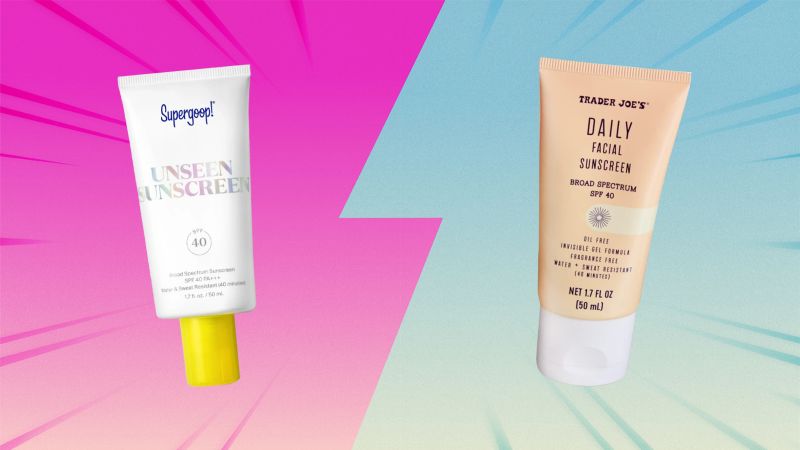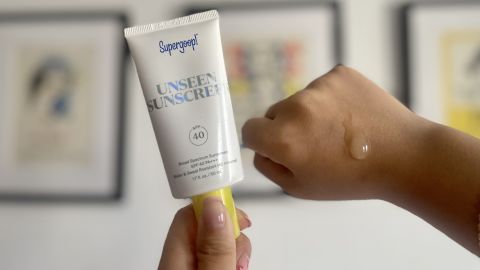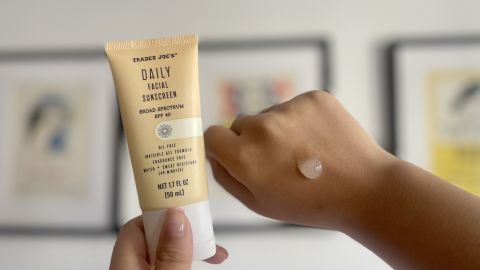
This article is part of our series Battle of the Brands, in which we compare category-leading products to their counterparts to determine which are actually worth your money.
Trader Joe’s generated beauty buzz last year when it released an invisible, matte sunscreen that the internet quickly compared to Supergoop!’s lauded Unseen Sunscreen. The #traderjoessunscreen hashtag blew up on TikTok and now has 9 million views. Skin care junkies and experts alike rushed to put it to the test — and now we are, too.
Both sunscreens use chemical filters to absorb UV rays and protect your skin from absorbing the harmful sunburn and skin cancer culprits instead. The Supergoop! and Trader Joe’s sunscreens have the exact same active ingredients (avobenzone, homosalate, octisalate and otocrylene) and offer the same SPF 40 protection.
The chemical filters allow the formulas to feel lightweight and apply invisibly, unlike the chalky feeling and whitecast you may get with some mineral sunscreens. The two formulas also share isododecane and dimethicone crosspolymer as the main ingredients.
As cosmetic chemist Javon Ford confirms in a TikTok, the products’ similar formulas provide a very close comparison in feel. The price difference can be attributed to the quality of the dimethicone crosspolymer and polymethylsilsesquioxane, which Ford notes can be quite expensive ingredients.
When shopping for sunscreen, you’ll want to look for a broad spectrum product. This means that the sunscreen will protect against UVA and UVB rays, which can both cause damage to skin cells that can ultimately lead to skin cancer. The Supergoop! and Trader Joe’s sunscreens both have broad spectrum protection, however, you’ll notice that the Supergoop! sunscreen has an additional PA+++ rating. So what does this mean?
The PA+ rating system was developed in Japan to indicate how much UVA protection a sunscreen provides. (The SPF system, on the other hand, measures how much protection a product provides from sunburn-causing UVB rays.) The scale ranges from PA+ to PA++++, with the latter having the highest amount of protection.
UVA rays account for 95% of UV radiation on Earth, and while they do not cause sunburns like UVB rays, you will get a tan from UV radiation as the rays penetrate the skin and cause cell damage. Furthermore, UVA rays are present with consistent intensity during daylight hours and can pass through clouds, fog and glass.
The PA+ system can work in tandem with SPF ratings, as they measure UVA and UVB radiation, respectively. However, many sunscreens are now broad spectrum and must meet FDA standards for UVA and UVB protection in order to be labeled as such. As mentioned, both the Supergoop! and TJ’s sunscreens are broad spectrum, so even though the Trader Joe’s tube doesn’t have the PA+ rating you can be ensured that it provides at least the FDA’s standard level of UVA protection. In the case of the Supergoop! sunscreen, the PA+++ indicator just gives further information to the consumer that it provides a high level of UVA protection.
Both have a gel-like consistency that apply with a soft, velvety feel and have a matte finish. In texture, they’re comparable to silicone makeup primers — and both state that they make great makeup primers, too. I didn’t experience any pilling with any other skin care or makeup products that I applied before or after the sunscreens.

The difference is subtle, but as Ford notes in his TikTok, the Supergoop! sunscreen has a more “cushiony” application than the Trader Joe’s alternative, which has a drier oil-feel (due to the silica — both formulas are oil-free). The Trader Joe’s sunscreen also has a longer dry down time, whereas the Supergoop! feels like it melts into the skin almost immediately.
One area in which I believe the Trader Joe’s sunscreen clearly wins is the product design. The Daily Facial Sunscreen has a convenient flip top, whereas the Unseen Sunscreen has a screw cap. It’s a small thing, but having to unscrew the top and the possibility of misplacing the cap does add some unneeded factors.

After going viral, the Trader Joe’s sunscreen quickly sold out on store shelves, which is the only place to buy it directly from the brand. In store, the sunscreen is only $9 — a quarter of the price of the Supergoop! Unseen Sunscreen. Because it can be tricky to buy direct, however, people have turned to third-party sellers, like on Amazon, to get their fix. This comes with a higher price tag — around $21 — due to shipping and processing costs from the seller.
On the other hand, Unseen Sunscreen is much easier to find if you’re in need of a sheer SPF. You can purchase it online from the brand or at Sephora, Ulta or the verified Supergoop! store on Amazon.
If you’re on a Trader Joe’s run, it’s worth checking the health and beauty aisle for the Trader Joe’s Daily Facial Sunscreen to save some money. But if you can afford it, the Unseen Sunscreen remains a top-recommended SPF that will seamlessly incorporate into your routine. Soft, scentless and completely sheer, both sunscreens provide an invisible veil of sun protection.
